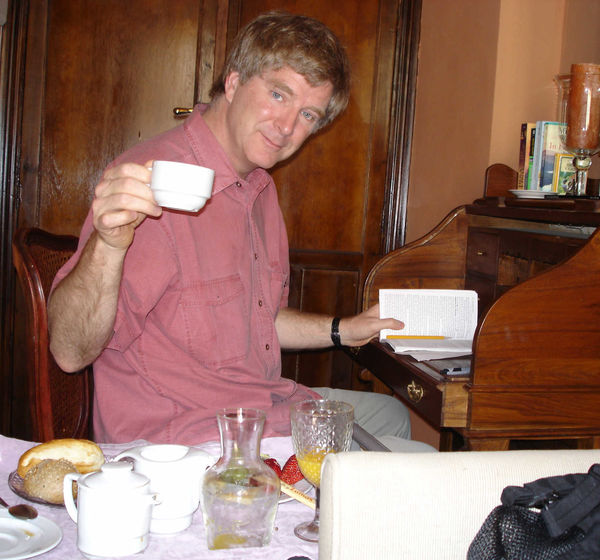Confessions of a Guidebook Writer
By Rick StevesLet me pack you along for a day on the road to help demystify what goes into the making of a guidebook.
While working in Europe, a guidebook writer's entire day's experiences are dedicated to research. I need to be a lint brush, picking up local tips, leads, and feedback. My secret research weapon is taking time to interview people running the hotels and restaurants already listed in my guidebook. They think I'm friendly and gracious to take time to chat, and while I truly enjoy it, it's also the best way for me to learn what works and what doesn't, along with the pitfalls and frustrations experienced by people traveling with my guidebooks.
In Madrid, my hotel didn't serve breakfast so I needed to find a place to eat. If it's a problem for me…it's a problem for my readers, too. I asked the receptionist to recommend a good churros place (cigar-shaped doughnuts Spaniards dunk in hot chocolate for breakfast). He said, "Americans want Starbucks…it's over there." I need to balance my interest in having people enjoy the old-fashioned cliché and the modern reality. I track down the churros place and dunk a few churros (it's a chain café…not much local energy), and treat myself to a latte and blueberry muffin (we're all just human) at Starbucks. Next year, both options — with frank appraisals — will be in the book.
Over coffee I review my goals for the day. A smart schedule is critical. Checking hotels before 10:00 is bad news — people haven't checked out yet — and the staff is still busy with breakfast. It's hard to see a room. Checking late in the afternoon is also bad — everyone's checked in for the day and places are reluctant to show rooms. Prime hotel-checking time is 10:00 to 3:00 p.m.
Restaurants are a big priority for any guidebook researcher. There are two hours of prime restaurant review time each evening. I take a minute to locate the places on a map and consider all the reader feedback I've received (both for existing places and tips on new places). Then it's off to drop in at as many eateries as possible. I can't eat everywhere…but I can talk to customers in each place. My reward — just before the kitchens close — is to eat at my favorite place.
Menus and the mechanics of ordering can be frustrating and need to be sorted out. If a stew is a local must-eat experience and big enough for two, I learn if splitting is allowed. If the place is mobbed after 8:30 p.m., I'll suggest ways to avoid the line. If the ambience is great on the ground floor and lousy downstairs, I'll say so. If it's dead on hot evenings (as many indoor places are), I make a note.
A researcher needs to physically visit the sights and do the walks. When I researched Madrid, I dropped by the cloistered nuns (just as I propose in the guidebook). Without being able to see anyone, I talked into the dark wood of their lazy Susan (me in English, them in Spanish), and ordered their cheapest cookies. This year the sisters spun out lemon shortcake. I measured the experience and affirmed that it'll work for my English-speaking readers.
I balance time between the major sights all travelers will do, and obscure and new sights. On that same Madrid visit I dropped by the ancient temple Egypt gave to Franco for helping save antiquities from the rising Nile while building the Aswan Dam. Everyone says it has the best city view in town. My experience: The temple is underrated, and the view overrated. A big wide view of Madrid only makes you wonder why anyone would build a city in this nondescript piece of Iberia. But nowhere else in Europe can you see an actual Egyptian temple standing in a park.
I filter out information on temporary exhibits and special events that will be gone next year. I don't care if the Queen's sharing her box at the Royal Albert Hall…if my readers can't do it next year, it doesn't exist, as far as I'm concerned.
After 30 years of this work, it stays fresh and there's always something new to learn. I still pull doors that say push and bump my nose on doors that say pull. When I get ripped off, I celebrate — I learned a scam and can now share it with my readers. And, somehow, I'm still as thrilled as ever to ride the train across the causeway approaching Venice…to step out of a cable car on the tip of a Swiss Alp…and to dunk those churros into my hot Spanish chocolate.


